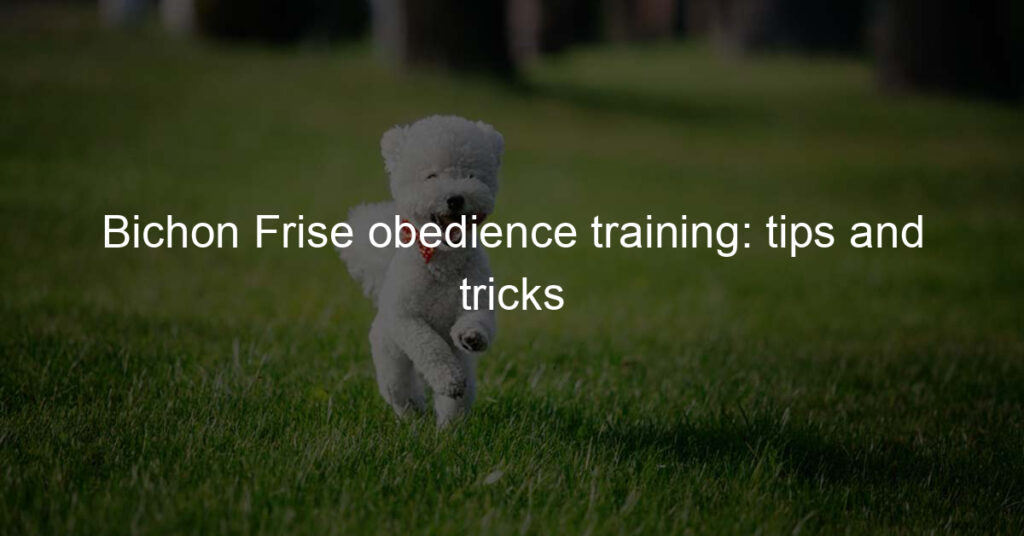Do you have a bichon frise? If so, then you know just how adorable they can be! But do you also know that this breed needs regular obedience training to stay well-behaved and remain healthy? With their intelligence and enthusiasm, bichons are quite easy to train. To help your pup develop good manners – and add some fun into the process – here are 8 tips for successful bichon frise obedience training!
- Start early – This will give your pup time to get used to commands and routines in a gentle manner, reducing the chance of developing bad habits later on.
- Use positive reinforcement – Let your pup know when he’s done something right with praise, treats, and/or affection, and never punish him for not understanding or getting it wrong.
- Break commands down into easy steps – Teach him one part of the command at a time and reward him for each success until he has mastered it completely.
- Practice regularly – Make sure you practice your pup’s commands regularly in different locations to keep him sharp and engaged.
- Keep sessions short – When training your bichon, aim for 5-10 minute sessions 3-4 times per week.
- Make it fun – Incorporate trick teaching, agility activities, and games into your sessions to make them more enjoyable for both you and your pup!
- Train in different environments – Take some of your obedience training sessions outside or to other places where there are new distractions – this will help your pup learn to focus even when there’s stuff going on around him.
- Seek help if needed – If you need extra help with training a bichon frise, don’t hesitate to enlist the help of a professional dog trainer or behaviorist.
How do you train a Bichon Frise?
Training a Bichon Frise can be an extremely rewarding experience, with just the right amount of patience and knowledge. To begin training, you’ll have to establish yourself as “the boss” so that your pup knows you’re in control! This is best done through positive reinforcement methods such as praising them when they do something right and offering treats as a reward. Consistency will be key here – make sure you provide the same cues and corrections every time, which will help your pup to learn quickly.
Socialization will also be important when it comes to training a Bichon Frise; introduce them to people, new environments, and other animals early on so that they feel comfortable wherever they go! Remember – controlling their environment is how you’ll ultimately control their behavior. With these training tips, your pup will be well on its way to being an obedient canine companion.
How do you calm down a Bichon Frise?
Taking care of a high-energy Bichon Frise can be a challenge, but learning the perfect recipe for calming them down is essential. First and foremost, give your pet plenty of physical and mental stimulation. Take them out for regular walks and playtime in the yard and provide lots of stimulating toys to help keep their brains active.
Additionally, you can also provide your pooch with a chew toy to redirect their energy when feeling anxious or overly excited. If that doesn’t help, using positive reinforcement such as offering treats when your Bichon Frise is calm and quiet is key. Remember, regardless of the situation, always remain patient with your furry friend; it’s not only helpful to their behavior but also to the bond between you two.
How do I teach my dog obedience commands?
Training your dog is an essential part of providing a happy, safe life for your pup. From basic obedience commands such as “sit” and “stay” to socializing around other people and animals, ensuring that your dog is well-behaved will make them more enjoyable to be around. Start simple by using treats as a reward system; whenever they do something right, offer them a treat or verbal praise.
Once your pup learns basic commands and is responding better to you, it might be time to consider puppy classes or professional training. This will help take their understanding of the rules of the house and behavior to the next level. Ultimately, there’s no one-size-fits-all approach when it comes to teaching your pup obedience commands, but with patience and commitment, you can become a proud owner of a well-behaved canine.
Conclusion
If you put in the effort to develop an obedience plan and work consistently with your Bichon Frise, you’ll see improvement. Try to integrate positive reinforcement methods into your training, as this will lead to faster and more effective outcomes. Always remain patient and consistent when training your pup – it takes time for new commands and behaviors to become second nature.
Remember: positive habits take time to form, but consistency is key! Find a balance between playtime and being firm with your pup; this will help them develop into well-behaved companions that can be trusted around other animals, people, and the environment. With patience and dedication, obedience training with your Bichon Frise is sure to be rewarding – Enjoy!








